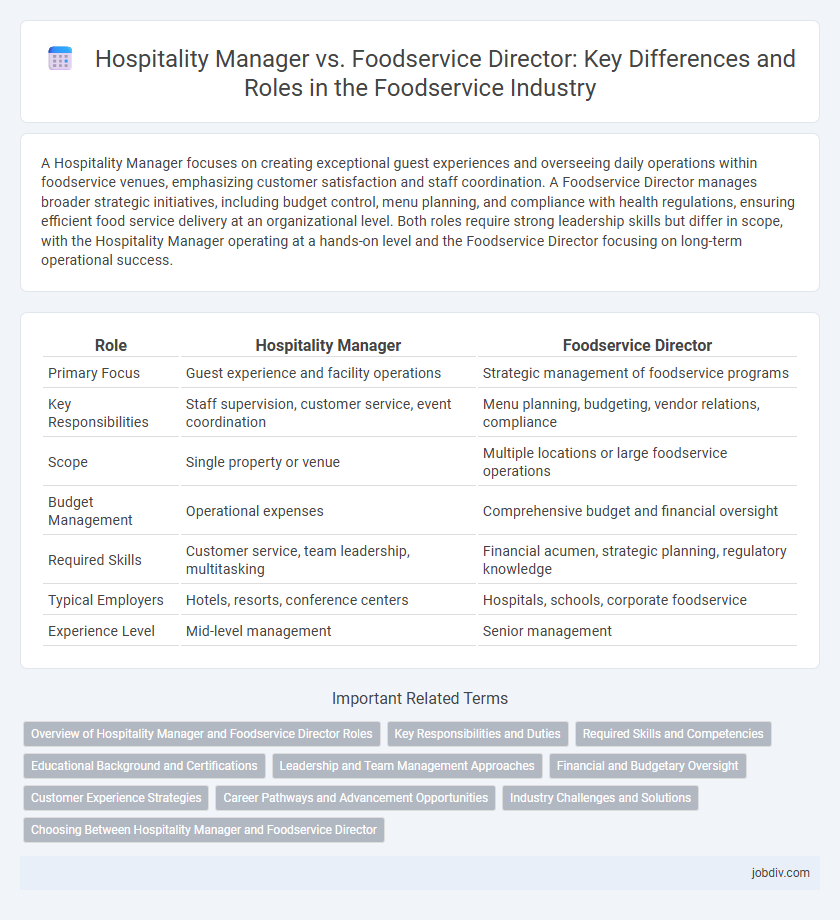A Hospitality Manager focuses on creating exceptional guest experiences and overseeing daily operations within foodservice venues, emphasizing customer satisfaction and staff coordination. A Foodservice Director manages broader strategic initiatives, including budget control, menu planning, and compliance with health regulations, ensuring efficient food service delivery at an organizational level. Both roles require strong leadership skills but differ in scope, with the Hospitality Manager operating at a hands-on level and the Foodservice Director focusing on long-term operational success.
Table of Comparison
| Role | Hospitality Manager | Foodservice Director |
|---|---|---|
| Primary Focus | Guest experience and facility operations | Strategic management of foodservice programs |
| Key Responsibilities | Staff supervision, customer service, event coordination | Menu planning, budgeting, vendor relations, compliance |
| Scope | Single property or venue | Multiple locations or large foodservice operations |
| Budget Management | Operational expenses | Comprehensive budget and financial oversight |
| Required Skills | Customer service, team leadership, multitasking | Financial acumen, strategic planning, regulatory knowledge |
| Typical Employers | Hotels, resorts, conference centers | Hospitals, schools, corporate foodservice |
| Experience Level | Mid-level management | Senior management |
Overview of Hospitality Manager and Foodservice Director Roles
Hospitality Managers oversee daily operations within foodservice establishments, ensuring exceptional customer experiences through staff management, service quality, and operational efficiency. Foodservice Directors focus on strategic planning, budget management, menu development, and compliance with health and safety regulations in larger or multiple foodservice venues. Both roles require leadership, industry knowledge, and agility in adapting to customer preferences and market trends.
Key Responsibilities and Duties
Hospitality Managers oversee daily operations, ensuring exceptional guest experiences and staff coordination within hotels, restaurants, or event venues. Foodservice Directors focus on strategic planning, budgeting, and compliance across multiple foodservice outlets, driving efficiency and profitability. Both roles require leadership, vendor management, and adherence to health and safety regulations, but Foodservice Directors hold broader operational control and long-term planning responsibilities.
Required Skills and Competencies
Hospitality Managers require strong customer service skills, team leadership, and operational knowledge to ensure seamless guest experiences and efficient daily operations. Foodservice Directors need advanced skills in strategic planning, financial management, and regulatory compliance to oversee large-scale foodservice programs and drive organizational success. Both roles demand excellent communication, problem-solving abilities, and a deep understanding of food safety standards.
Educational Background and Certifications
Hospitality Managers typically hold a bachelor's degree in hospitality management or business administration, often complemented by certifications such as Certified Hospitality Supervisor (CHS) or ServSafe Manager certification. Foodservice Directors generally possess advanced degrees in foodservice management, nutrition, or hospitality, with preferred certifications including Certified Foodservice Executive (CFSP) and Registered Dietitian Nutritionist (RDN) for those overseeing nutritional standards. These educational credentials and certifications ensure expertise in operational leadership and compliance within the foodservice industry.
Leadership and Team Management Approaches
Hospitality Managers emphasize hands-on leadership, fostering direct communication and team motivation to enhance guest experiences. Foodservice Directors adopt strategic leadership, focusing on cross-department coordination and long-term operational planning to drive efficiency and growth. Both roles require strong interpersonal skills but differ in scope, with Hospitality Managers leading frontline teams and Foodservice Directors managing broader organizational functions.
Financial and Budgetary Oversight
Hospitality Managers oversee daily financial operations, ensuring budget adherence within individual venues, while Foodservice Directors manage broader financial strategies across multiple units or entire organizations. Foodservice Directors analyze revenue trends, control costs, and develop long-term budgets to maximize profitability and operational efficiency. Both roles require strong financial acumen, but Foodservice Directors hold higher-level budgetary authority and strategic planning responsibilities.
Customer Experience Strategies
Hospitality Managers prioritize enhancing guest satisfaction through personalized service, staff training, and ambiance optimization to elevate the overall customer experience in foodservice establishments. Foodservice Directors implement comprehensive customer experience strategies by integrating technology solutions, data analytics, and operational efficiencies to streamline service delivery and tailor offerings based on consumer preferences. Both roles focus on maximizing customer loyalty and repeat business, but Hospitality Managers emphasize frontline engagement, while Foodservice Directors drive strategic planning and resource allocation.
Career Pathways and Advancement Opportunities
Hospitality Managers typically oversee daily operations within hotels, restaurants, or event venues, gaining experience in team leadership, customer service, and operational management, which positions them for advancement into Foodservice Director roles with broader strategic responsibilities. Foodservice Directors hold executive-level oversight of multiple outlets or large-scale foodservice operations, focusing on budgeting, compliance, and long-term planning, making this role a key step toward senior leadership positions such as Regional Director or VP of Foodservice. Career pathways evolve from managing specific venues to directing complex foodservice systems, offering advancement through increased scope, responsibility, and influence over organizational success.
Industry Challenges and Solutions
Hospitality Managers face daily operational challenges such as staffing shortages and customer satisfaction, requiring adaptive scheduling software and enhanced training programs. Foodservice Directors address broader industry issues like supply chain disruptions and regulatory compliance by implementing strategic sourcing and robust health protocols. Both roles leverage technology and leadership to optimize efficiency and maintain service quality in a competitive foodservice environment.
Choosing Between Hospitality Manager and Foodservice Director
Choosing between a Hospitality Manager and a Foodservice Director depends on the scale and scope of operations; Hospitality Managers typically oversee guest services and staff coordination in hotels or resorts, while Foodservice Directors manage large-scale food operations in institutions like hospitals or universities. Foodservice Directors hold broader responsibilities, including budget management, menu planning, and compliance with health regulations, making them ideal for complex foodservice systems. Assessing organizational needs, leadership experience, and operational complexity helps determine the appropriate role to ensure efficient foodservice management.
Hospitality Manager vs Foodservice Director Infographic

 jobdiv.com
jobdiv.com